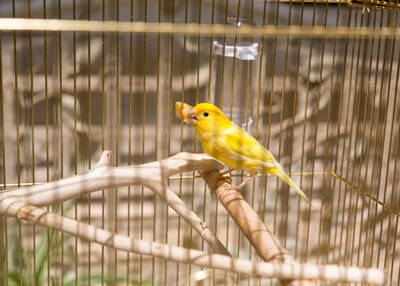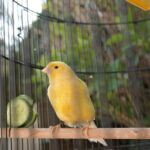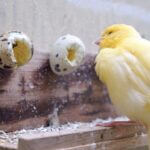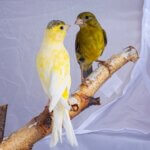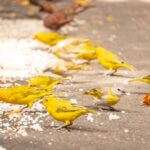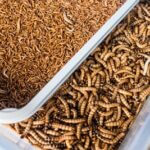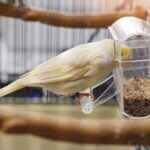Canaries need a balanced diet to improve their mood, feather growth, and overall health. While some owners believe seeds are enough, canaries also require veggies, grains, and fruits.
Even with higher sugar content than other natural meals, fruits are a great source of vitamins, minerals, antioxidants, and other nutrients, as well as flavor to entice your canary.
What Fruit Can Canaries Eat?
Canaries come from the Macaronesian Islands, located in the North Atlantic Ocean. Most of the fruits available to wild canaries are tropical fruits, including:
- Bananas
- Guava
- Papaya
- Mango
- Lychee
- Orange
How Much Fruit Should A Canary Eat?
Fruits and vegetables should consist of 20% of a canary’s diet. This amounts to 1-2 small pieces of fruit per day.
You can incorporate this into meals using fresh, frozen, or dried fruit. It depends on your budget, storage plans, and what your canary prefers.
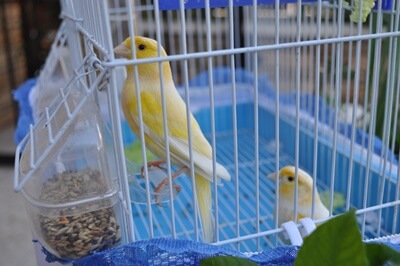
What Fruits Are Best For Canaries?
Whether you’re preparing a fixed meal for your canary or want to share a snack with your pet, here are some fruits that are good for canaries to eat:
Bananas
Bananas are rich in vitamins A, B6, C, and potassium. Canaries often enjoy the texture and flavor.
However, removing the skin is best, as they don’t contain few nutrients, and canaries can’t digest the fiber overload well. Banana skins can also absorb pesticides, which poses a danger.
Strawberries
Strawberries contain vitamins C and K and potassium. Notably, they also contain folate, which is good for bone health and recovery from illness, two factors that canaries rely heavily upon. Folate is also an important nutrient for juvenile birds, assisting with healthy cell growth.
Unlike some fruits, strawberry seeds are safe for canaries to eat, and they’re small enough to be digested properly and don’t contain toxins. You can also include the strawberry tops for added nutrients.
Raspberries
Raspberries contain vitamins A, B, and C and are high in potassium and magnesium. Most notably, they contain a lot of antioxidants.
Raspberries are also rich in amino acids needed for building proteins, hormones, and neurotransmitters.
Just feed raspberries in moderation and switch them up with other fruits.
Cherries
Cherries are nutritionally dense. As a low-calorie fruit, they contain vitamins A, C, and K, alongside potassium, magnesium, and calcium.
Birds rely heavily on calcium to fuel bone strength, feather growth, and egg-shell creation. Canaries are also prone to stress, so the antioxidant-rich nature of cherries can help counteract that.
There are many varieties of cherry, each with a different taste. As a rule, the darker the cherry, the more antioxidants it contains. You can also classify them into two categories: sweet and tart. Switch up the varieties to add novelty to your canary’s diet.
Just be sure to remove the pits before feeding and thoroughly wash each one.
Blackberries
Blackberries are nutritionally dense in vitamin C, K, fiber, and manganese. Blackberries are also a great source of antioxidants, alongside blueberries, raspberries, and pomegranates.
Blueberries
According to the Journal of Zhejiang University, blueberries have the highest level of antioxidants of common berries. To add flavor and variety to your canary’s meals, stick to wild blueberries, which have twice the number of antioxidants as regular blueberries.
Cranberries
Cranberries are rich in vitamins C, E, and K1. They are also a source of manganese, copper, and antioxidants like polyphenols and flavonols.
Cranberries are made up of 90% water and aren’t as antioxidant-rich as other berries, but they can provide a vitamin boost and serve as a hydrating treat.
They taste sour; some canaries may love them, while others avoid them.
Guavas
While not as popular as citrus fruits, guavas are one of the richest sources of vitamin C, containing twice the amount as an orange. They’re also packed with antioxidants, providing your canary with flavor and helping against oxidative stress.
Grapes
Grapes are the ideal size and texture for canaries to play with or peck at. They’re packed with vitamin C and antioxidants, which keep the body healthy.
Most importantly, they promote bone health with vitamin K, calcium, magnesium, and potassium.
You don’t need to peel the skin when feeding grapes to your canary.
Apple
Canaries will love the crunch and sweetness when apple is chopped into slices or pieces. Just remember to remove the seeds, as they contain traces of cyanide.
Pomegranate
Pomegranate seeds are healthy for canaries to eat since they’re packed with antioxidant compounds, like polyphenols. These have been linked to anti-cancer and anti-inflammatory effects.
Pomegranates can safeguard your canary against age-related health problems.
Apricots
Apricots are nutritionally dense fruits. While low in calories, they’re rich in vitamins A and C.
Apricots are one of the most calcium-rich fruits and contain flavonoids. According to Nutrients, animal studies have found that flavonoids have anti-diabetic effects.
Oranges
Oranges are one of the best sources of vitamin C, making them ideal for preventing diseases and bolstering the immune system. The juicy, stringy texture and powerful flavor can entice your canary into enjoying a slice as both a snack and a toy.
Cantaloupe
Cantaloupes belong to the same family as watermelons and honeydew, which are related to cucumbers, pumpkins, squashes, and guards. Cantaloupes contain vitamins A and C, potassium, zinc, and calcium.
Honeydew
Like the other plants in its family, honeydew is rich in fiber, which is helpful for your bird’s digestive system. Honeydews are also rich in vitamins B6, C, K, potassium, and magnesium minerals.
Honeydew seeds are safe for canaries, but you can also find seedless varieties.
Dates
Dates tend to be sold dry, making them more nutritionally dense than other fruits on this list. Dates are chewy and sweet, giving them a unique texture.
Both fresh and dried dates contain the following vitamins and minerals:
- Vitamin B6
- Magnesium
- Copper
- Iron
- Potassium
Plums
Plums are full of vitamins, minerals, and antioxidants, which have been shown to reduce bone loss and, in some cases, heal scarred tissue.
However, as with most fruit pits, remove the seed before offering this treat to your canary.
Tangerines
Tangerines contain nutrients like vitamin A and fiber, especially vitamin C.
This branch of the orange family is packed with beta-cryptoxanthin and flavonoids, bolsters immunity, prevents cancer, and keeps the brain healthy.
Pineapple
Pineapples are rich in nutrients such as:
- Vitamin B6
- Vitamin C
- Thiamine
- Folate
- Copper
- Potassium
- Magnesium
- Iron
However, don’t overfeed pineapple to your canary, as it contains a lot of natural sugar. Likewise, avoid store-bought pineapple juice, as it has added unhealthy ingredients for birds.
Mangoes
Mangoes are rich in omega 3 and 6 fatty acids at a balanced ratio. Furthermore, mangoes contain proteins and vitamins in the meat, alongside antioxidants and fiber in the skin.
Kiwi
Also known as Chinese gooseberry, kiwis are rich in vitamins like:
- Vitamin C
- Vitamin E
- Vitamin K
Kiwis also contain lots of copper, potassium, and magnesium. Kiwis can be sliced fresh or dried, depending on what your canary likes.
Papaya
Papayas are rich in vitamins A, B9, and C. However, their real health benefit comes from antioxidants. Specifically, papayas are rich in carotenoids, which give papaya flesh its orange color.
Papayas should only be served ripe when the skin turns orange. Unripe papaya, which has green skin, can be dangerous when offered to birds.
Papaya seeds are safe for canaries, but the skin should be avoided unless it’s entirely organic.
Pear
Pears contain vitamins C and K, potassium, and copper. They’re also antioxidant-rich, especially in the antioxidant flavonoid.
According to the Journal of Food Composition and Analysis, pears are good sources of flavonoids, which have anti-inflammatory and anti-cancer properties.
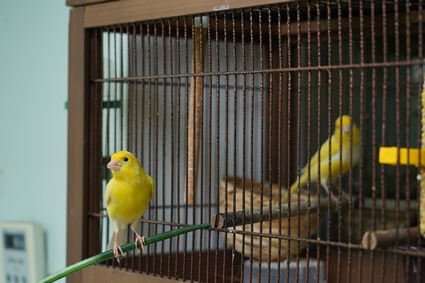
Passionfruit
Passionfruit has a juicy center that canaries love to eat. You can choose the most common variety, the Passiflora edulis, which is small, oval, and purple on the outside. Another type is the Passiflora flavicarpa, which is larger and yellow.
Passionfruit contains vitamins A and C and minerals like iron and potassium.
Watermelon
Watermelons are rich in vitamins A, B1, C, phosphorus, and potassium.
Just be sure to only feed watermelon in moderation, as it has a high water content and can lead to runny poop in canaries. Likewise, don’t include watermelon seeds when feeding your canary.
You can juice the watermelon and give it to your canary as an alternative to water, providing it with vitamins and a refreshing flavor change.
Lychee
Lychees are fruits you can often find in the Asian supermarket aisle. They contain a grape-like flesh that provides an interesting texture to canaries.
Lychees are rich in vitamin C and iron. Lychee also contains bone-health minerals like manganese, magnesium, phosphorus, iron, and copper.
Nectarine
Nectarines and peaches are a nice treat for canaries. They contain vitamin C, flavonoids, anthocyanins, and polyphenols.
Remove the pit first. Nectarine pits contain cyanide and are unsafe for your canary.

